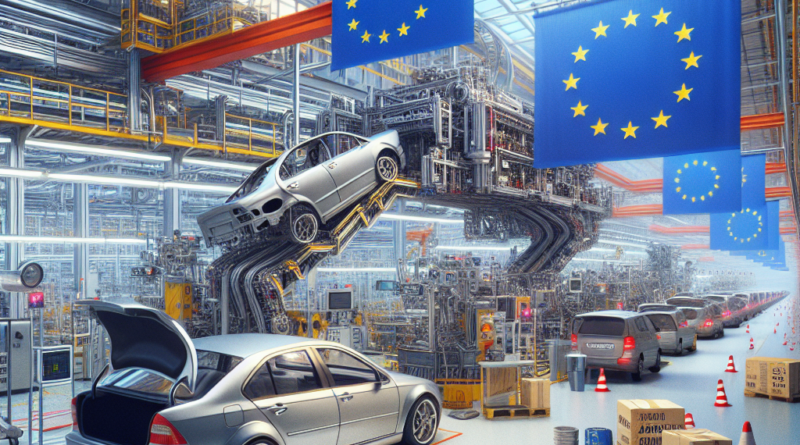Volkswagen’s Crisis: A Wake-Up Call for All of Europe
“`html
The Challenges Faced by Volkswagen and the Implications for Europe
The current crisis at the German automotive giant Volkswagen reflects not only the economic decline of Germany but also raises significant concerns about the broader automotive sector in Europe.
For 87 years, Volkswagen has been a symbol of Berlin’s industrial strength, yet the unresolved challenges it faces serve as a warning signal for the entire European automotive market and, by extension, the future economic recovery of the continent.
As Europe delays the race towards electric vehicles, many regional car manufacturers struggle to adapt to this crucial transition.
This struggle reveals the shortcomings of an industrial system bogged down by bureaucracy and outdated practices.
Competitive Disadvantages in Electric Vehicle Production
Volkswagen, along with Volvo Cars, has recently scaled back ambitious plans to compete with industry leaders like Tesla and emerging Chinese rivals.
Two primary reasons contribute to this pullback: the absence of affordable models that attract average consumers and the reduction of government incentives aimed at promoting electric vehicles.
The result of these shifts has been a stark decline in sales, with July statistics showing battery-powered car deliveries plummeting over 10% across the region.
Germany, the largest market in Europe, faced an alarming 37% drop, signaling significant market volatility that has caught manufacturers off guard.
Strategic Changes and Global Market Position
The strategic adjustments being made by European carmakers could jeopardize their standing in the global automotive industry.
The Volkswagen case exemplifies this precarious situation.
Ongoing deliberations regarding the potential closure of German factories have only just begun, hinting at a protracted dispute with far-reaching implications throughout the region.
Competitors like Stellantis and Renault are closely monitoring developments, as they too grapple with their own crises.
Ferdinand Dudenhöffer, director of CAR-Center Automotive Research in Bochum, warns that Europe is quickly losing its cost advantages.
This trend will enable China to continue expanding its competitive edge in the electric vehicle market while European cost structures lag behind.
Amidst this decline in demand for electric vehicles, the broader automotive market remains about 20% below pre-pandemic levels, further impacting the profitability of traditional vehicles.
Adapting to New Market Dynamics
Last Wednesday, Volvo Cars announced it would not pursue its goal of selling only fully electric vehicles by 2030 due to disappointing demand.
Now, the company intends for plug-in hybrids and fully electric models to constitute at least 90% of sales by the decade’s end.
Similarly, VW and other manufacturers are realizing they must alter their approaches.
Mercedes-Benz has also expressed concerns over the market’s development pace.
Initially committing to an electric-only future by 2030, CEO Ola Källenius recently acknowledged that combustion engine models will likely persist for another decade, indicating that transformation may take longer than anticipated.
Barriers to Mass Electric Vehicle Adoption
European automakers have struggled to offer electric vehicles capable of appealing to the mass market.
High-end models like the Porsche Taycan and BMW i7 cater to wealthier consumers, with affordable alternatives remaining scarce.
The electric Fiat 500, once a symbol of accessible mobility, now costs nearly €35,000—double that of its combustion engine counterpart.
In contrast, Chinese manufacturers seize opportunities in Europe’s slow transition, introducing competitively priced electric vehicles like the BYD Dolphin at €33,000, undercutting the €37,000 starting price of VW’s ID.3.
Despite VW’s commitment to launching a budget electric vehicle, its high production costs pose a significant obstacle.
The Role of Economic Structures
Recent comments by European climate commissioner Wopke Hoekstra underscored the impacts of labyrinthine bureaucracy and the absence of a unified capital market in the EU, blocking the timely development of the automotive industry in response to current challenges.
“The core problem is that we have fallen behind, and our economic and industrial systems seem entrenched in the past,” he stated.
In contrast, Chinese firms in the electric vehicle and battery markets are younger and more agile, while leading US tech giants remain relatively recent players.
In summary, the Volkswagen crisis not only highlights specific issues but points to broader, urgent concerns.
The entire European industrial system risks falling too far behind the curve, threatening job security and investment commitments across the continent.
“`




